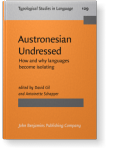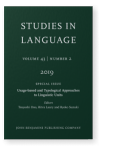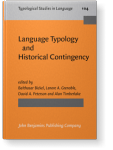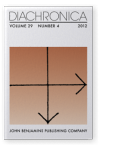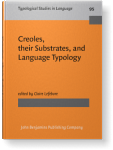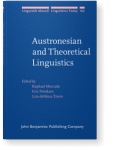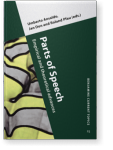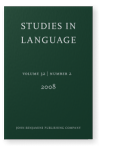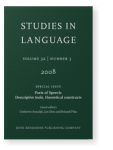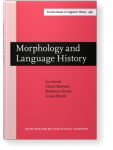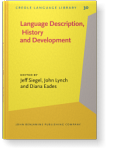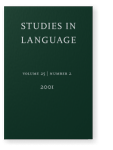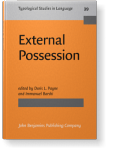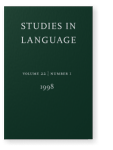Mark Donohue
List of John Benjamins publications for which Mark Donohue plays a role.
2020 Chapter 10. Becoming Austronesian: Mechanisms of language dispersal across southern Island Southeast Asia and the collapse of Austronesian morphosyntax Austronesian Undressed: How and why languages become isolating, Gil, David and Antoinette Schapper (eds.), pp. 447–482 | Chapter
We examine the spread of Austronesian languages as a process that proceeded in different ways at different times, even in the same locale. We examine the many ways a language can show ‘Austronesian traits’, and confront this with the known presence of pre-Austronesian languages across Island… read more
2019 Truth, person, and personal truth: Kuke copulas, a construction caught between descriptive systems Usage-based and Typological Approaches to Linguistic Units, Ono, Tsuyoshi, Ritva Laury and Ryoko Suzuki (eds.), pp. 444–458 | Article
In this paper we present data on the copula system of Kuke, a language of the lower Nubri valley, in northern Nepal. We present data showing that the system of copulas cannot easily be categorised in terms of the different descriptive categories that are frequently used in discussion of… read more
2013 Who inherits what, when? Toward a theory of contact, substrates, and superimposition zones Language Typology and Historical Contingency: In honor of Johanna Nichols, Bickel, Balthasar, Lenore A. Grenoble, David A. Peterson and Alan Timberlake (eds.), pp. 219–240 | Article
There has been much discussion on the kinds of linguistic traits that can be borrowed, and under what circumstances, and the relationship of different kinds of contact to areality. This article suggests that phonological aberrancies, in terms of the family to which a language belongs, in the core… read more
2012 New methodologies for historical linguistics? Calibrating a lexicon-based methodology for diffusion vs. subgrouping Diachronica 29:4, pp. 505–522 | Article
Recent research claims that analysis of lexical cognate classes for a basic wordlist can reproduce linguistic subgroups within the Austronesian family (Gray et al. 2009). The analysis is open to question in two respects. Primarily, the lexically-based classification, primed with pre-established… read more
2011 Papuan Malay of New Guinea: Melanesian influence on verb and clause structure Creoles, their Substrates, and Language Typology, Lefebvre, Claire (ed.), pp. 413–435 | Article
Of the Malay varieties of Southeast Asia, Papuan Malay is the most removed both geographically and linguistically from the “homeland” of Malay. While showing no more lexical differences than other Malay varieties, it represents an extreme divergence from the morphosyntax of the better-described… read more
2010 The case of possessors and ‘subjects’ Austronesian and Theoretical Linguistics, Mercado, Raphael, Eric Potsdam and Lisa deMena Travis (eds.), pp. 103–116 | Article
Possessors have often been treated as the ‘subjects’ of the DPs in which they appear, being analyzed as surfacing in [spec, DP] by analogy to the standard analysis for clausal subjects in a configurational framework of grammar. In this paper , we present a new descriptive generalization showing… read more
2010 Covert word classes: Seeking your own syntax in Tukang Besi Parts of Speech: Empirical and theoretical advances, Ansaldo, Umberto, Jan Don and Roland Pfau (eds.), pp. 87–106 | Article
2008 Complex predicates and bipartite stems in Skou Studies in Language 32:2, pp. 279–335 | Article
I examine a range of complex predicates, searching for ones that might be called ‘bipartite stems’ in Skou, a language of New Guinea. First I draw a tentative distinction between serial verb constructions and N+V predicates on the one hand, and ‘true’ bipartite stems on the other, while pointing… read more
2008 Covert word classes: Seeking your own syntax in Tukang Besi Parts of Speech: Descriptive tools, theoretical constructs, Ansaldo, Umberto, Jan Don and Roland Pfau (eds.), pp. 590–609 | Article
Examining syntactic categories in Tukang Besi, an Austronesian language of Indonesia, we find that there are additions to the traditional fixed categories. In addition to the firmly definable categories of nouns and verbs, there are many lexical items that are precategorial: they may be used,… read more
2008 3. Bound pronominals in the West Papuan languages Morphology and Language History: In honour of Harold Koch, Bowern, Claire, Bethwyn Evans and Luisa Miceli (eds.), pp. 43–58 | Article
2007 29. Lexicography for your friends Language Description, History and Development: Linguistic indulgence in memory of Terry Crowley, Siegel, Jeff, John Lynch and Diana Eades (eds.), pp. 395–405 | Article
2001 Coding choices in argument structure: Austronesian applicatives in texts Studies in Language 25:2, pp. 217–254 | Article
The syntactic properties of applicatives have received a large amount of attention. Despite this there have been almost no attempts to explain the reasons behind the choice of an applicative coding of an argument when there is an grammatical oblique coding strategy available. This study focuses on… read more
1999 Syntactic Roles vs. Semantic Roles: External Possession in Tukang Besi External Possession, Payne, Doris L. and Immanuel Barshi (eds.), pp. 373–402 | Article
1998 Transitivity in Tukang Besi Studies in Language 22:1, pp. 83–111 | Article
The Tukang Besi language does not appear to display a clear distinction between transitive and intransitive clauses, as transitive verbs are freely able to appear without any overt object and degrees of intransitivity are to be found in the language. The ground between transitive and intransitive… read more
